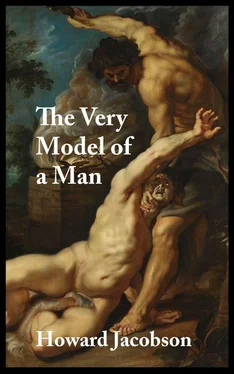He was standing beside a reddened fig tree, which I’d observed and then perversely encouraged in an act of parasitism quite breathtaking in its beauty. It climbed the trunk of whichever helpless unsuspecting host tree took its fancy, attained the summit, and from there sent down its own roots, a curtain of shimmering foliage which was at once a deed of suffocation and the veil behind which the deed was concealed. A murder and its alibi. A theft — for murder is only theft — in the guise of a gift.
I explained its principles to Adam. I got him to feel the tenacity of the fig’s grip. I made him put his ear to its branches, to hear the hectic unrhythmic breath of voracity. I walked him through the ensanguined curtain so that he should enjoy its leafiness and behold the victim, blanched and hapless, without expectancy, without vitality, without worth, within. Thus does the stronger, I said, eclipse the weaker, in will, in splendour, in elation, in vigour, and in promise.
I did not believe everything I said. If you care to hear the truth from me, I did not believe any of it. But it was my intention, my hope, to inspire my father to disgust. I looked forward to his reprimand. I welcomed with an anticipation that was almost sensual, that was certainly of the body, the idea that he would so far take cognizance of me as to find my words shameful.
He screwed up his eyes. He rubbed the back of his neck. He ran his hands across the fibrous curtain as though every whip contained a note and he might make music out of them. He looked me up and down with great indecision. He put his ear back to the parasite. Then he stuck out his tongue, and said, Bleh!
Bleh?
He was smiling at me, I think smiling at me, and panting like a dog. Bleh! Bleh!
He wanted us to play together. To roll around in the warm dirt like a couple of bears.
I didn’t move. I didn’t extend a paw. So there’s no point in looking to you for an example then? I said. The only word you have for me is Bleh!
He withdrew his tongue and allowed all the muscles in his face to slacken. It was a punitive collapse. Look how old you have made me, his face said. But there were no actual words exchanged. We stood looking at each other in reproachful silence. The only sounds to be heard in my garden were vegetable-vindictive: the groans of throttled plants, the viscous dripping of my euphorbias, the ticking of voodoo lilies, and the slow predacious rattle of my favourite epiphytic tillandsia opening its fans. Otherwise nothing. The primordial dejection of fathers makes no sound. Nor the primordial hard-heartedness of sons.
Why do you want an example? he asked at last.
So that I can resent it, I said.
He turned to go. Awkwardly. I mean physically awkwardly. He had been so badly made that he could barely swivel without falling.
Resent someone else, he said. His parting word. He made it sound mysterious, a riddle infinitely tormenting. But in truth I did not have that many choices.
Is it possible that He — HE — had been listening to this conversation? Or was it nothing but mere chance that directed an angel of the Lord into my garden a mere fifteen minutes after my father — father with a little f — had left it?
It’s a tricky business, balancing fortuitousness with design, especially when He whose design is in question is also the One who sets up the mechanism whereby chance operates. Ascribing motives is trickier still. An Unseen Hand is on the wheel; It might or might not have turned it; It might or might not have meant to; in these circumstances it takes an eternity just to decide what we mean by Whim.
Nevertheless, an angel landed. Which means that he’d been sent. Which means there was intention somewhere down the line. And behind intention, reasoning. And behind reasoning, promptings viewless as air.
I have had time — not eternity, but time enough — to consider what they might have been.
HE was sentimentally attached, like all truants, to the impression He imagined He had left on the hearts of those He had deserted. It was time to gaze with fondness upon this idealised image of Himself again.
HE had been rebuffed elsewhere and wanted confirmation of affection. (This would explain the lengths the angel was to go, explaining the protocol of oblation.)
HE had observed that my parents were no longer keeping company at night and that there was therefore no imminent prospect of further offspring — no sisters, that is, for Abel or for me to mate with (supposing such coupling to be allowable, exceptionally, for the purposes of procreation). If we weren’t to die out as promptly as we’d sprung up, some intervention, some initiative for change, was necessary.
HE disliked the aromas rising from my garden.
HE was bored with Divine Vacancy. An appetite for drama is incident to whoever comprehends time, and we were His theatre.
HE had begun to notice Abel’s beauty.
I do not offer this as an exhaustive list. They are the motives I most favour, that is all. I am aware, therefore, that they might say more about the complexion of my mind than they do about the Tetragrammaton’s. Especially in the case of the last motive — no, I must return to my original word: the last prompting — I have attributed to Him.
It is certainly a delicate matter. And full of contradictions. Have I not already stated that this God was no gatherer-in of grapes or grape-boys? Yet something has to explain why, as soon as Abel reached his thirteenth birthday, the Lord,
Suddenly made the removal of the prepuce — a superfluity of skin for which He alone had originally been responsible — an issue of the first importance in relations between man and God…
Suddenly expressed a desire to taste the best of my brother’s flock…
Suddenly demanded a comparable tribute from me, at which He promptly turned up His nose…
Suddenly put the idea of holiness into my brother’s head, and the words with which to express it into my brother’s mouth…
Suddenly sent down an angel, one of whose functions, whatever else he had dropped to earth for, was to make my brother more than ever aware that he was fair, and found grace in the eyes of whosoever beheld him…
Suddenly decided it was time to make it known to me, by that same angel, that I wasn’t, and that I didn’t…
Suddenly had all of us, in short, imbuing my brother’s penis with piety, and Abel himself, stripped down to his shirt, dancing between his sheep, lighting fires, and perspiring prettily.
The angel’s name was Saraqael, but we had to force that information out of him. Unlike Semyaza, he was unforthcoming about himself; though unlike Azael, he was not surly in his reserve. We had to guess him — that’s what it came to. He was an angel of the personal enigma, and we had to work him out.
This did not apply to the new regimen of rituals and duties he had been sent to institute. In every instance this was punctilious and undeviating: a specific code of regulations governing cuts of meat, precise frying times, just this amount of seasoning and no more. Aside from metaphysical questions — the wheretos and the wherefores of all this ceremonial circumcision and cookery — his instructions were unambiguous. Here’s the blade, there’s the spirit; there’s the ox, here’s the skillet. Which might be why he made such a puzzle of himself. Men who practise the routine, pedantic professions — keepers of rolls and registers, collectors of duties, temple functionaries and monitors — frequently like to drape gaudy veils and gauzes around their wheretos and wherefores. And officiant angels are presumably no different.
But guessing him was only the half of it. Once we’d guessed him — that’s to say, guessed close — we had to please him. And this was a tougher proposition still. For he was an austerely melancholy angel, with a blazing black stubble on his chin, and blazing black eyes that held the memory of tears but the promise of reproof, and a strange coronal of blazing black hair, cut severely, as though to suggest abstemiousness, but worn somehow with dash, with a consciousness of styling and design, as though also to appease whatever vanities (and there, perhaps, abstemiousness is a vanity) obtained in the celestial courts. As for his wings, these he carried high and inflexibly, gathered into his sides like a cloak. And they too were the colour of a raven. To bring relief to that solemn countenance, to coax the light of laughter or approval out of those funebral eyes, at the very least to send a flutter through his rigid feathers, became, for each of us, our first and sometimes our only concern. We lined up to lighten him. We competed for the privilege. And when we failed — and we failed more often than we succeeded — we took our failure to heart and thought the worse of ourselves as a consequence.
Читать дальше











